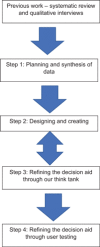A decision aid to support family carers of people living with dementia towards the end-of-life: Coproduction process, outcome and reflections
- PMID: 34288291
- PMCID: PMC8483186
- DOI: 10.1111/hex.13307
A decision aid to support family carers of people living with dementia towards the end-of-life: Coproduction process, outcome and reflections
Abstract
Background: Family carers of people living with dementia often need support with making decisions about care. Many find end-of-life care decisions particularly difficult. The aim of this article is to present an evidence- and theoretical-based process for developing a decision aid to support family carers of people with dementia towards the end-of-life.
Methods: Following a systematic process, we developed a decision aid using coproduction methods and matrices to synthesize data from a systematic review and qualitative interviews with people living with dementia and family carers. Data were presented to coproduction workshops of people living with dementia, family carers, practitioners and professionals. Development was guided by the Ottawa Decision Support Framework and a modified Interprofessional Shared Decision-Making model.
Results: The decision aid covers four decision areas: (1) changes in care; (2) eating and drinking difficulties; (3) everyday well-being; and (4) healthcare, tests and medication. We present an interactive decision aid, using a variety of approaches including written text, Frequently Asked Questions, top tips and illustrative quotes from people living with dementia and family carers.
Conclusion: This is the first decision aid that focusses on multiple decisions towards the end-of-life in dementia care. The process offers a template for others to develop decision aids or similar interventions, and how to include people living with dementia in coproduction.
Patient or public contribution: Family carers provided feedback on data collection, data analysis and the decision aid, and one is a coauthor. People living with dementia and family carers were integral to the coproduction workshops.
Keywords: carers; codesign; coproduction; decision-making; dementia; end-of-life care.
© 2021 The Authors. Health Expectations published by John Wiley & Sons Ltd.
Conflict of interest statement
The authors declare that there are no conflict of interests.
Figures
References
-
- Prince M, Prina M, Guerchet M. World Alzheimer Report 2013. Journey of caring: An analysis of long‐term care for dementia. London; 2013.
-
- Alzheimer's Society. Dementia UK: Second edition. London; 2014.
-
- Lewis F, Karlsberg Schaffer S, Sussex J, O'Neill P, Cockcroft L. The Trajectory of Dementia in the UK ‐ Making a Difference. London; 2014.
-
- Molyneaux V, Butchard S, Simpson J, Murray C. Reconsidering the term ‘carer': a critique of the universal adoption of the term ‘carer'. Ageing Soc. 2011;31(03):422‐437.
Publication types
MeSH terms
Grants and funding
LinkOut - more resources
Full Text Sources
Medical




